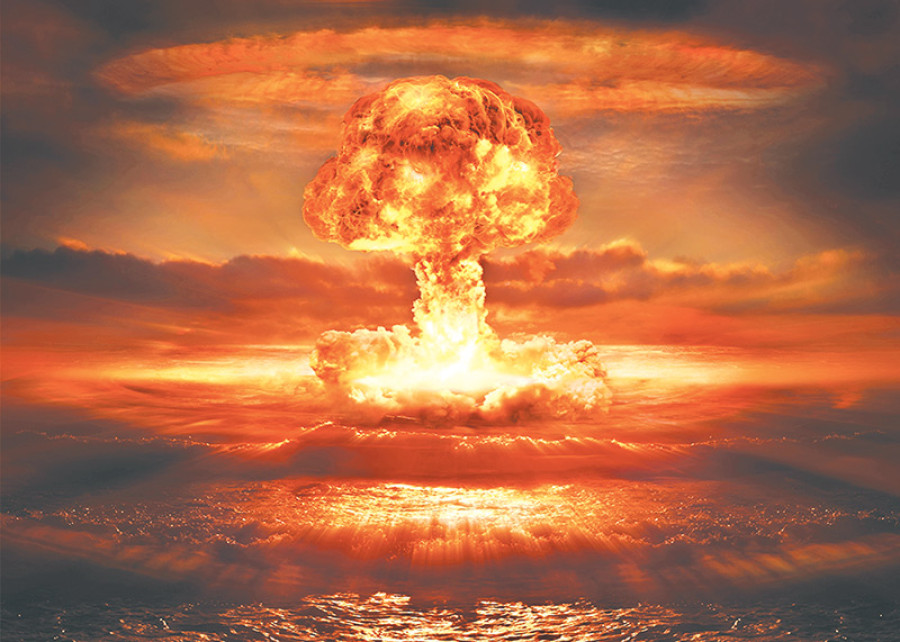Opinion
Mother of all evils
Nuclear bombs may kill millions of people, but they cannot kill ideologies and concepts
Shyam Kc
Recently, the United States dropped an extremely powerful non-nuclear bomb in Afghanistan; its target was ISIS stronghold tunnels. There are claims that the bomb killed over 90 ISIS fighters, but unbelievably, not a single civilian. Officially known as Massive Ordinance Air Blast (MOAB), the bomb is said to be the most powerful non-nuclear bomb in the possession of the US. The US had not used this 10-tonne MOAB before.
Necessity of bombs
This is the first time that such a bomb was used, and what better place to hold a demonstration than Afghanistan? Afghanistan is among the poorest countries of the world. Could the big and powerful countries be using small countries to carry out their experiments? Maybe not. But according to the Cable News Network (CNN), former Afghan President Hamid Karzai accused the US of using Afghanistan as “a testing ground for new and dangerous weapons”. While this accusation might sound tenuous since the US is fighting an extremist terror organisation such as ISIS, there are questions of whether such a powerful bomb was necessary to neutralise and
eliminate ISIS.
But the real question is whether bombs can ever improve a situation. All through the ages, there have been endless clashes between different religious and political concepts. The Christians of Europe mounted an armed campaign known as the Crusades in the Middle Ages; their aim was to free the Holy Land and Jerusalem of “infidels”. The series of Crusades started towards the beginning of the 11th century and ended near the dawn of the 13th century. The conflict that spanned over almost 200 years was a result of the conflict of faiths.
Historians point out that peace is a very rare phenomenon; there have been conflicts ever since the evolution of humankind. In the thousands of years of human history, real peace all over the world is said to have prevailed for less than 100 years. There have always been bloody armed conflicts between tribes or groups of people professing different faiths or ideologies. This practice continues, and those who are rich and powerful are to blame for the rampant killings in some developing countries. Rich countries have a monopoly over peace and power.
Global policing
With the dawn of the 21st century, killing in the name of democracy and human rights has not stopped. The American invasion of Iraq, and the US-led coalition in Afghanistan to remove the Taliban from power led to the deaths of over 250,000 civilians. The large number of fatal civilian casualties in Libya and Yemen also indicate that powerful countries try to act as the global police force, and those who are wounded in the process of such “policing” are considered collateral damage. This can be likened to the dropping of atomic bombs in Hiroshima and Nagasaki—the US justified its actions by saying the bombs were dropped to prevent the loss of millions who would have died at the hands of the Japanese. Thus, “policing” continues to this day.
Yet conflict continues because of the prevalent religious, political and philosophical differences. Many countries in the western world may claim themselves to be secular nations, but it is understood that they are guided by traditional religions that they have followed throughout the ages. They want these guiding principles to prevail the world over. This naturally brings about both emotional and physical conflict, resulting in killings from all sides.
Strange bedfellows
The Al-Qaeda and ISIS have been labelled “terrorists”. Nepali rulers had once dubbed the Maoists “terrorists” (though the Maoists themselves claimed that the uprising was an “insurgency”). It is interesting to note that those in power decided to declare Maoists as “terrorists” during the conflict, and yet later decided to join hands with those whom they had dubbed “terrorists”. The US followed Nepal’s practice of dubbing the Maoists as “terrorists” and removed the tag in 2012 when the Maoists came to power in Nepal.
In Syria, the US is openly helping anti-Assad forces. In retaliation to chemical attacks against civilians, the US dropped a series of almost 60 Tomahawk missiles in Syria. The US had no conclusive proof of whether the Syrian government was indeed responsible for the chemical attacks. Today, there is a chorus of opposition from the western nations against North Korea. Why? Is it because North Korea has nuclear weapons and delivery mechanisms in the form of missiles? There is no reason why the development and use of nuclear weapons should be allowed in powerful countries. The world should unite to ensure that all nuclear weapons are destroyed. No country should be given the rights to possess such weapons that have the potential to kill millions and poison the environment. If rules prevent some countries from possessing nuclear weapons, then why should powerful countries be exempt from the restrictions?
Bombs, as most know, cannot stop conflicts. Nuclear bombs may kill hundreds of thousands of people but they cannot kill ideologies and concepts. These bombs are the mother of all evil and can only lead to unnecessary conflicts that result in the killings of millions of innocents. But eradicating such weapons is a wishful dream that can only become a reality when those in power realise that bombs are not the weapons with which to fight ideologies, be they political or religious.




 15.12°C Kathmandu
15.12°C Kathmandu










